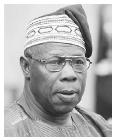NIGERIA
Olusegun Obasanjo
President

(pronounced "oh-LOOS-eh-gun oh-ba-SAN-jo")
"Today, in place of anarchy and dictatorship, we have a constitutional and democratic system of government whose stability and permanence are underwritten by the people themselves, and which, in spite of the periodic crises we have encountered…promises to be the surest way of guaranteeing the freedom of the people, and the maximum satisfaction of their just expectations."
The Federal Republic of Nigeria occupies 923,768 sq km (336,667 sq mi) with a 2002 population estimate of 130 million, making it Africa's most populous country. The nation's capital city, Ajuba, is centrally located in the nation's interior. Lagos, the former capital with over 10 million people, remains the country's financial and cultural center. Its southern boundary lies on the Gulf of Guinea while northern neighbors include Niger and Chad. Nigeria shares a border with Benin in the west and Cameroon to its east. Nigeria's widely varied topography consists of tropical swamp-like mangroves along coastal areas, with tropical rainforests extending 125–188 km (100–150 miles) inward, becoming a savannah and wooded plateau and a semidesert in the northern region of the country. The climate ranges from humid tropical weather in the south to arid and dry conditions in the north.
Nigeria's diverse ethnic, linguistic, and religious characteristics contribute to cultural and artistic enrichment and fractious political conditions. The major ethnic groups include the Hausa (21%), Yoruba (21%), Ibo (18%), and Fulani (9%). The Hausa have traditionally dominated the northern region of the country while the Yoruba have a pronounced influence in Nigeria's western region, and the Ibo's reside largely in the country's eastern region. While more than 250 languages and dialects are spoken throughout the country, two-thirds of Nigerians speak either Hausa, Yoruba, or Ibo. The official language, reflecting Nigeria's colonial experience, is English. Approximately 50% of Nigerians are Muslim, 40% Christian, and 10% practice traditional African religions. Life expectancy was estimated in 2001 at just over 51 years and the literacy rate was 57%.
The Nigerian economy is based on petroleum products, which account for 95% of all exports and 20% of its total economic activity. In the 1980s, when Nigeria benefited from high oil prices, the average per capita income exceeded us$1,500. As prices declined in the 1990s, however, the country's economy experienced contraction and acute crisis. Coupled with the decline of the second most important economic activity, agriculture, Nigeria's per capita income had declined by 2001 to US $840. Nigeria's major trading partners are the European Union (EU) and the United States. The national currency, the naira , has experienced continued devaluation.
ADDRESS
Office of the President
Abuja, Nigeria